Our activities
Excursions
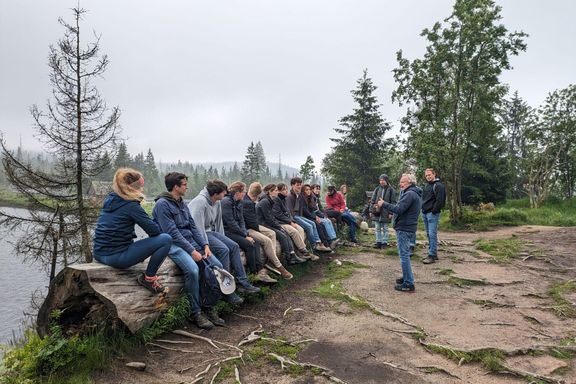
Excursion May 2024 - Find out what southern Lower Saxony has to offer for crop protection scientists
The annual excursions and meetings are important components of the youngDPG's work and are intended to provide insights into the operations and work of plant production, the plant protection industry, the authorities and public research and advisory institutes and associations.
The excursions, which usually take place in May, last three to four days and are organized by the spokesperson of the youngDPG. In years in which the German Plant Protection Conference does not take place, destinations in other European countries are also visited.
The program of the excursion 2024 with all information about the excursion can be found here! The 2024 excursion has already taken place - information on future events/excursions/workshops can be found at jungedpg@~@phytomedizin.org - be there next time!
2019: Bodenseeregion
2018: Rheinhessen
2017: Südtirol
2016: Groß Lüsewitz
2015: Rheinland
2014: Hallertau
2013: Pfalz
2012: Quedlinburg, Gatersleben, Höhnstedt
2011: Meißen
2010: Pfalz
2009: Schweden
2008: BASF
2006: KWS
2005: FIBL
2003: Bayer
2002: Syngenta
Grüne Woche
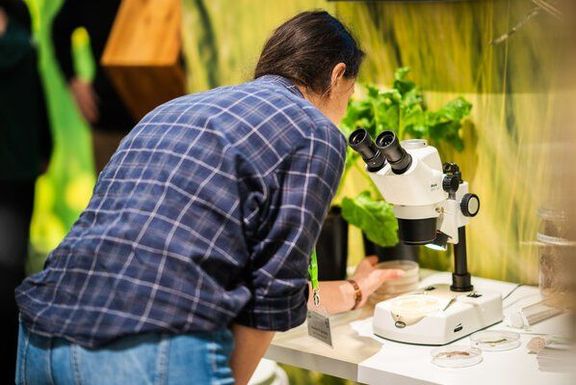
The youngDPG organizes a stand at the IGW together with the Industrieverband Agrar
For several years now, we have been organizing the meeting point on the topic of plant protection at the Internationale Grüne Woche in Berlin in cooperation with the Industrieverband Agrar (IVA). We introduce consumers to the wide range of pathogens and pests as well as the range of control methods, including beneficial organisms. Thanks to the maize, wheat, sugar beet and rapeseed plants we have grown especially for the trade fair, we have become a green eye-catcher in the hall. However, when visitors approach the stand, they quickly realize that some plants do not look as healthy and vital up close as they first thought. This is due to infections with pathogens typical of the crop. In recent years, consumers have discovered the following diseases, for example:
- Leaf spot on sugar beet (Cercospora beticola)
- Fusarium head blight (Fusarium graminearum)
- Powdery mildew on wheat (Blumeria graminis f. sp. tritici)
- Sclerotinia stem rot on oilseed rape (Sclerotinia sclerotiorum)
A planting box is also used to simulate how a wheat crop develops when no plant protection measures are taken and is dominated by weeds and volunteer oilseed rape.
The crowd-pullers are and remain the "moving" exhibits in the form of mealworms as classic storage pests. Some mealworms even manage to develop into beetles during the week of the fair, allowing visitors to see all stages of the pest. The smallest living exhibits are our beneficial insects. For example, the parasitic wasps, which surprise many visitors with their small size. They can be observed in glass tubes under the binoculars parasitizing eggs of the corn borer moth and are thus presented as part of an overall concept for biological control of the corn borer. In addition to the parasitic wasps, common beneficial insects such as ladybugs, lacewings and their larvae, predatory thrips and predatory mites are also on display. In addition to the native pests, the invasive stink bug Nezara viridula was also a real eye-catcher. Many visitors quickly realized that they had already seen enough of this non-native species in their homes and allotments.
At the IGW, ministers, members of parliament and consumers from all over the world can get an idea of the possibilities of integrated pest management and plant nutrition at the joint stand of the IVA and the young DPG.
Members of the youngDPG who would like to take on a two-day stand service at the IGW are welcome to contact the youngDPG spokespersons at any time.
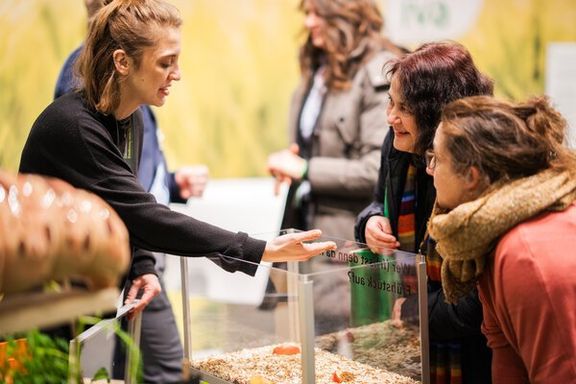
youngDPG at DPST
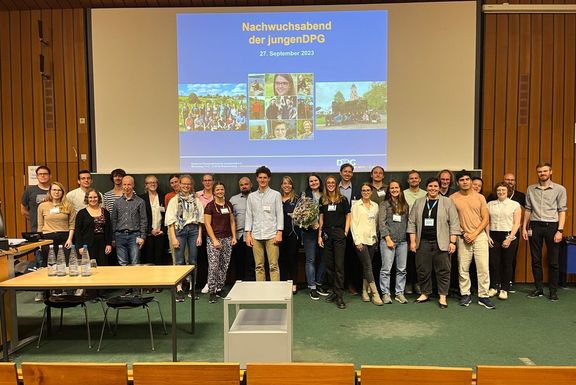
Get to know the youngDPG in person at the German Plant Protection Conference!
As part of the German Plant Protection Conference, it has become established that the youngDPG organizes its own section as well as the youngDPG Young Scientists' Evening. The Young Scientists' Evening offers the opportunity to get to know the young DPG, its members and young scientists with different careers in a pleasant atmosphere. The section deals with current, often hotly debated topics from the field of plant protection. In addition, since 2023 there is also the possibility to find and get to know companies and their representatives as well as possible job offers at the career corner of the young DPG.
Student Reporters

Journalism and crop protection? - You bet!
During the 60th German Plant Protection Conference in Halle (Saale), we developed a new medium, the "PhytoTelegraph". This two-page conference newspaper was also published daily and contained reports, interviews, event information and pictorial impressions of the event. As the response from the reporters, interview partners and readers was consistently positive, we continued the format at the next plant protection conferences.
We are planning the next edition of the "PhytoTelegraph" for the next German Plant Protection Conference and are looking forward to it. Interested youngDPG members are cordially invited to contribute.
We hope you enjoy reading it and look forward to your feedback and suggestions for future improvements.
Phyto Telegraph DPST 2023 Göttingen
Phyto Telegraph DPST 2023 Sonderausgabe
Phyto Telegraph DPST 2023-09-24
Phyto Telegraph DPST 2023-09-25
Phyto Telegraph DPST 2023-09-26
Phyto Telegraph DPST 2023-09-27
Phyto Telegraph DPST 2021 online
Phyto Telegraph DPST 2021-09-21
Phyto Telegraph DPST 2021-09-22
Phyto Telegraph DPST 2021-09-23
Phyto Telegraph DPST 2018 Stuttgart Hohenheim
Phyto Telegraph Sonderausgabe DPST 2018
Phyto Telegraph Dienstag DPST 2018
Phyto Telegraph Mittwoch DPST 2018
Phyto Telegraph Donnerstag DPST 2018
Phyto Telegraph DPST 2016 Halle
Phyto Telegraph Sonderausgabe DPST 2016
Phyto Telegraph Dienstag DPST 2016
Phyto Telegraph Mittwoch DPST 2016
Ideen Expo
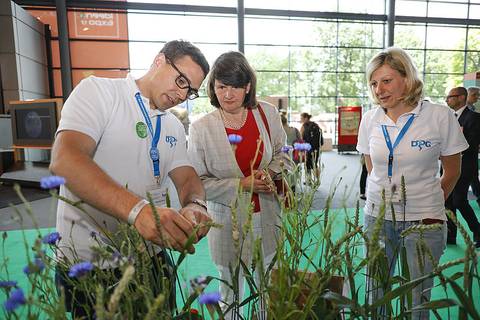
Young plant doctors represented at the IdeenExpo since 2017
The IdeenExpo is a biennial, admission-free hands-on and experience event for children, teenagers and young adults at the exhibition grounds in Hanover. Companies, research institutions, universities and schools from Lower Saxony in particular take part in the event. The aim of the event is to arouse more interest in MINT professions (MINT stands for mathematics, information technology, natural sciences and technology).
The IdeenExpo, Germany's largest youth event for science and technology, aims to secure the next generation of skilled workers. The JKI took part in the joint stand "We are the plant doctors", which was designed by the young scientists of the German Society of Plant Protection and Plant Health (DPG). With exhibits from the field of agriculture (presentation of diseases, use of beneficial organisms, stock protection), pupils, parents and teachers can be shown what green professions deal with as examples and what career opportunities crop protection offers.
2017 marked the start of the "Crop protection" career presentation by the youngDPG in this format. We are always on the lookout for committed members to support the stand. If you are interested, please contact the spokespersons of the youngDPG at any time.
Contribution to NAP
Since 2018, the youngDPG spokespersons have also been able to actively participate in the forum on the National Action Plan for the Sustainable Use of Plant Protection Products. Here you can experience first-hand the debates at the interface between politics, interest groups and science.
